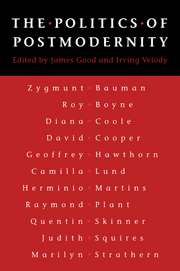Book contents
- Frontmatter
- Contents
- Acknowledgements
- Notes on contributors
- 1 Introduction: postmodernity and the political
- Part I Modernity and its vicissitudes
- 2 Parvenu and pariah: heroes and victims of modernity
- 3 Private and public in ‘late-modern’ democracy
- 4 Modernity and disenchantment: some reflections on Charles Taylor's diagnosis
- 5 Postmodernism and ‘the end of philosophy’
- Part II The critique of modernist political thought
- Part III Technology and the politics of culture
- Index
3 - Private and public in ‘late-modern’ democracy
Published online by Cambridge University Press: 05 June 2012
- Frontmatter
- Contents
- Acknowledgements
- Notes on contributors
- 1 Introduction: postmodernity and the political
- Part I Modernity and its vicissitudes
- 2 Parvenu and pariah: heroes and victims of modernity
- 3 Private and public in ‘late-modern’ democracy
- 4 Modernity and disenchantment: some reflections on Charles Taylor's diagnosis
- 5 Postmodernism and ‘the end of philosophy’
- Part II The critique of modernist political thought
- Part III Technology and the politics of culture
- Index
Summary
The achievement of modernity, social theory has suggested, is to erase particularity and create a universality: to create an identity, it might be called, which turns on no particular save that of the nation-state whose nationality, as its citizens, we share, and turns on no properties beyond those we are given by law. This is not to say that we are not individuated. The state requires us to be. But the individuation it demands says nothing about who we are as persons or in society. It serves merely to identify our public status as private citizens of the state. If we retain anything of a more particular kind that is also public, it is our position in the market.
Conceptions of modernity and their origins are innumerable. The social theories of modernity are in their direction, and often their direct inspiration, Kantian. They present the possibility of potentially autonomous agents exercising the distinctively human faculty of reason; being willed to be treated and to treat others as autonomous rational agents; and being able to realise this ambition under the rational law, a form of life in which they can live together without contradiction.
- Type
- Chapter
- Information
- The Politics of Postmodernity , pp. 36 - 48Publisher: Cambridge University PressPrint publication year: 1998



